Decentralized Publishing: Book Ticket NFT "The Fool"
Is this the future
This is a poem quoted by the independent bookstore "Bookstore" last year. At that time, Yinshudian cooperated with the traditional e-book platform "Dumo" to launch the atypical publication "Digital Publishing Project". I also participated in it, interviewed and wrote non-ordinary author/reader Dr. Yang Siyi, and completed an eISBN-only e-book ( Theme recommendation: Yang Siji talks about future reading ).
The future is far and near, and the publishing market is increasingly difficult. After another year, I met LikeCoin's DePub (DePublication Decentralized Publishing) (thanks to Matt citizen friends and Matty for letting me join), and I was immersed in the sea of NFT art every day. So I wanted to continue last year's theme of exploring the possibilities of digital publishing in the future.
"The Fool" will be the preface to a series of essays that, rather than a tirade, are explained in action.
Library Book NFT <The Fool>
I cooperated with the bookstore and released a book ticket NFT "The Fool" (The Fool). This time, the most basic form of exchange volume is adopted. If you buy a library ticket from the bookstore, you can exchange for three books: "Anger and Hope" X "Blockchain Sociology" X "Ether Surprise", three books and the Internet Citizenship Movement, District Blockchain history is closely related.
At this moment when social platforms, web3, and NFTs are rolling up like a heat wave, these three books must be read, and I have enjoyed reading all three.
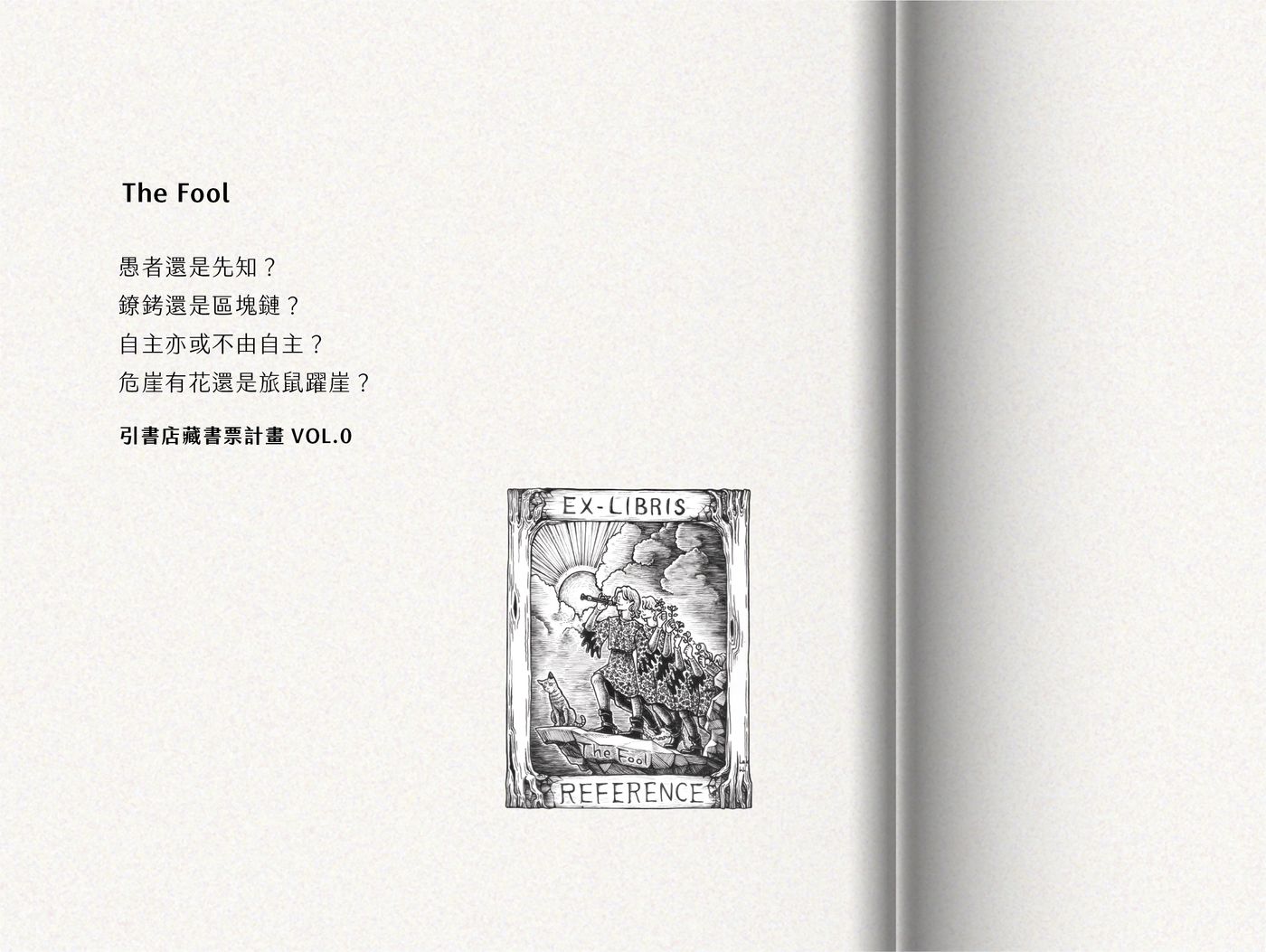
Fool or Prophet?
Shackles or Blockchain?
Autonomous or involuntary?
Does the cliff have flowers or lemmings jump the cliff?
This library book was drawn by my senior Lala W. It depicts a group of clowns in shackles, playing the flute and singing songs, marching in unison to the cliff. At this time, the sky is clearing the clouds and the sun is shining, where will the future be?
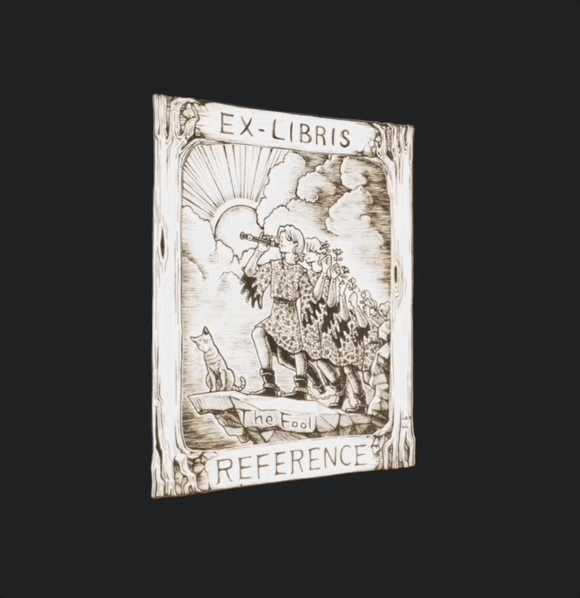
The necessity of digital reading
Kevin Kelly mentioned in "The Inevitable" that the future will be the era of mass reproduction of electronic copies, and any invention of paywalls is futile; information is eager to flow, and it is difficult for us to restore the era of paper books The knowledge-economy flourished, and those who wrote books at that time could make huge profits. But on the other hand, paper books are actually a kind of information authority. The right to distribute and read is controlled by a few people, and poor families have no chance to buy books or even read them. The most typical example is the religious scriptures of parchment and manuscripts before the publication of the Gutenberg printing press.
I believe that no one wants to go back to that era.
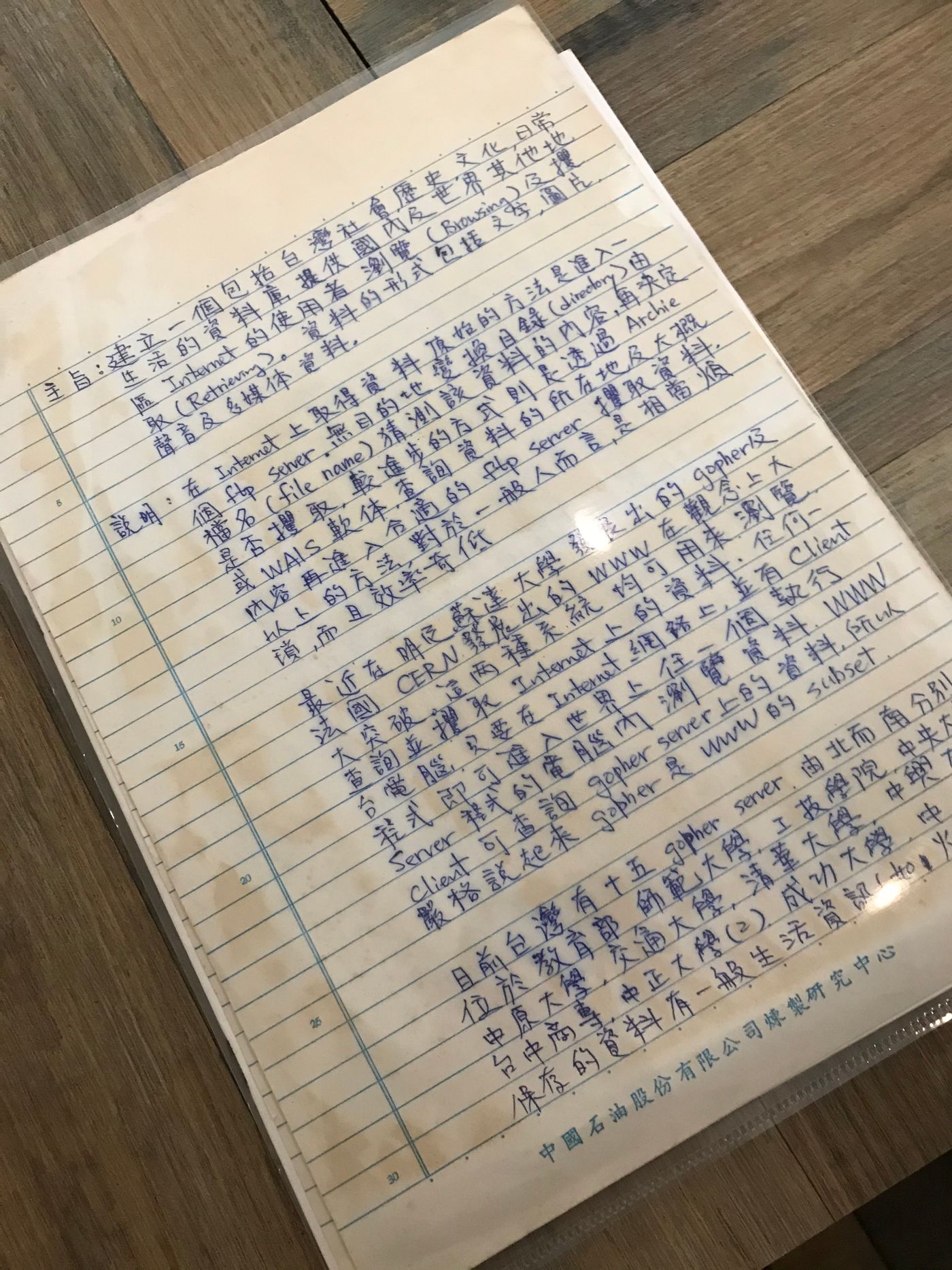
This yellowed manuscript was completed in 1993 and was written by Xiao Jingdeng himself. The blue handwriting was written on the manuscript paper of "China Petroleum Corporation Refining Research Center" without a title. At the beginning, it was written "Purpose: To establish a database containing Taiwan's society, history, culture, and daily life, to provide Internet users in China and other parts of the world to browse and grab...", this manuscript later became Taiwan's first web page "Taiwan Social and Cultural Network", Taiwan's Internet has been formed since then. These "pioneers" of Taiwan's Internet history call web pages and digital texts "the atomic bomb of the poor". Xiao is now the director of the office of the Science and Technology Association. He believes that the web is a great invention after printing.
web3 vs. web0
However, with the accelerated circulation of words, it is difficult for creators to keep up with the profit model. Nearly 30 years of e-reading history, dozens of business models have emerged, and the text industry complex has continued to evolve. (This part will be discussed in the next article)
Back in modern times, Chris Dixon gave a concise description of web3,
web1 = read only (page times that can only be read);
web2 = read & write (readable and writable, interactive community platform era);
web3 = read, write, own (blockchain era with electronic assets)
The above description is really beautiful. What about the paper book?
I think the paper book is web0. In the past we could have a book and flip through it at any time (own+read). Despite the poor circulation of paper books, they can still be bought and sold in the second-hand book market. With the advent of e-books, we only have the right to read, but we never owned it and couldn't sell it. And the "ownership" of NFTs may just rediscover the "sense of ownership" of paper books.
In the most future society, we will get used to no piracy. A pirated copy would equal a free copy, while a genuine copy would equal a paid original. Or Kevin Kelly, he said that no one wants to buy free things, but some practices outside the paywall will increase consumers' purchasing motivation, which he calls "Generative" , and the value of the originality must be generated during the transaction. Just once, it cannot be counterfeited, copied or stored. KK lists eight primordials, which I'll leave to next time.
Based on nativeness, I list six possibilities between NFTs and publications, arranged in a spectrum from centralized to decentralized.
- Gift : redemption code (the book is in the database, and the reading right is obtained with a single purchase)
- Reading : Library key (books are in the library, purchase account permissions)
- Owned : Book Owned (paid-for-restricted e-books)
- Support : free reading, purchase support author, get author certification
- Group solicitation : free reading, authors propose publishing plans, readers pay in advance
- Shares : free reading, early supporters get revenue share
These six models are my mixed thinking with the latest "decentralized publishing" under the framework of the publishing industry ecosystem with the existing centralized database and professional division of labor. LikeCoin has launched ISCN (International Standard Content Number) tool for decentralized publishing (commonly known as DePub). Decentralized storage services such as IPFS and Arweave make it possible for texts to exist semi-permanently; while ISCN integrates and stores metadata to help us find these texts more easily. You can think of ISCN as a signpost for decentralized texts.
However, ISCN currently lacks a business model and related ecosystem. In fact, when the International Book Number (ISBN) was born, it was established because of the demand for "books are commodities". Therefore, if the same book is on different carriers, such as e-books, physical books, and audio books, there may be different book codes because of different sales needs.
Nowadays, NFT brings a lot of "transactions" to people's imagination, whether it is a new bottle for an old wine, or the birth of a new model, the text of the NFT has recently begun to be hotly debated. NFT is literary works, cover design, reading keys, membership cards, equity, etc. The above concepts are complex, but I believe that the new services that can really disrupt the market will be simple and easy to understand.
Here are two cases where "free copies" and "electronic originals" coexist:
- "Blockchain Sociology" by @高 reconstruction
- iRD [institutions of Resolution Disputes] (2015) by Menkman
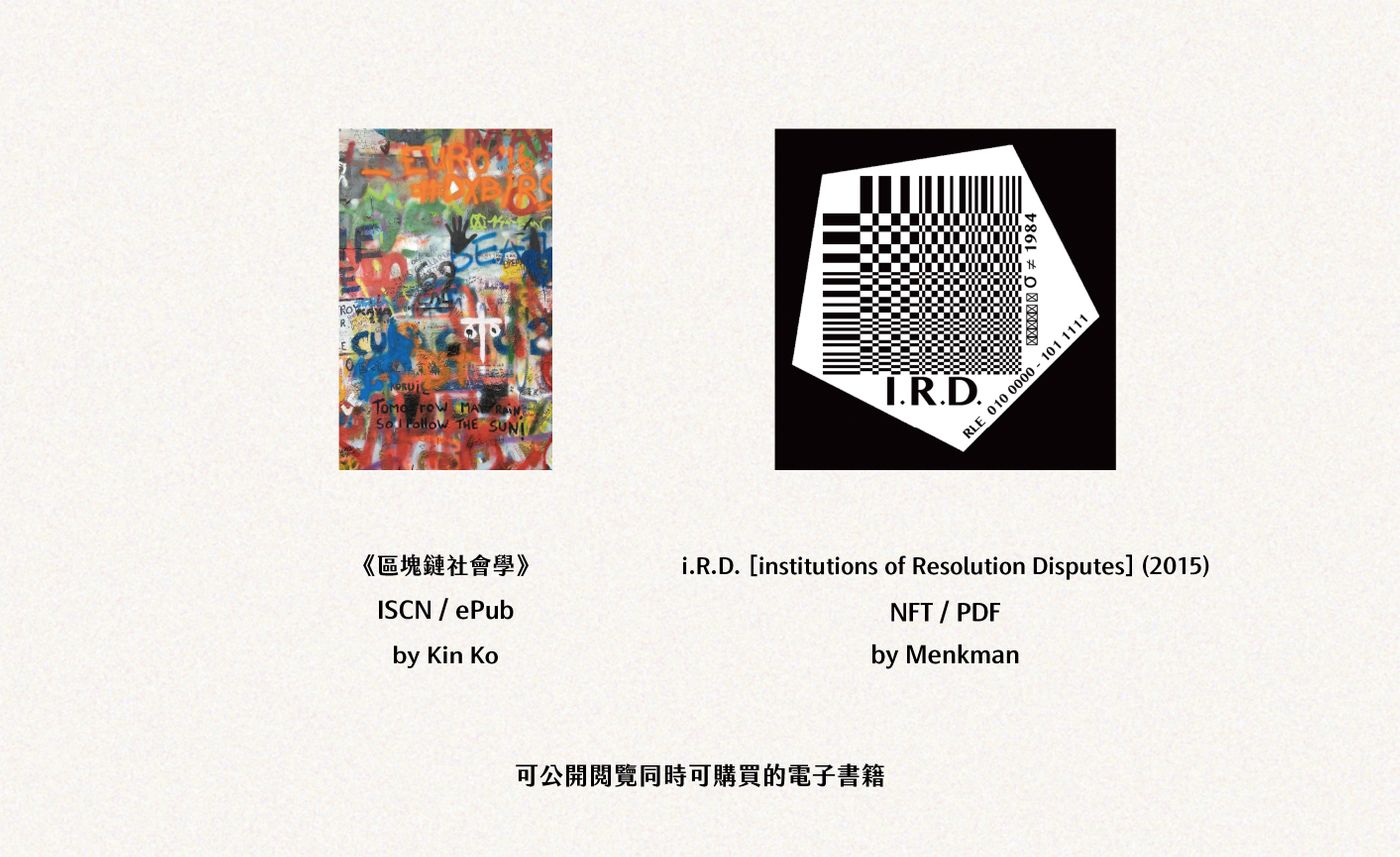
Both books can be read for free, but at the same time they provide purchase channels. Kin provides a cryptocurrency remittance address (and also provides a limited number of ten NFTs for sale on the Foundation NFT platform); Menkman directly mints PDFs into NFTs and puts them on Hic Et Nunc The platform is sold, of course, you can read PDF without purchasing NFT.
The above two books are the concept of support by purchasing. (I have favorites)
Library Book NFT and Podcast
This time, we discuss the easiest and least impacting attempt on the existing ecology, the library book.
The transfer (exchange) function is used.
This is an NFT called "The Fool", drawn by Lala.W and issued by the bookstore, limited to 50 pieces.
We reversed the original function of the library book. Originally, the book book was used to announce who the owner of the book was. Now we spread the name of the book book collector on the NFT platform, so that everyone can know who owns the book book.
As long as you buy NFT in the primary market, the bookstore will send you three e-books, namely "Blockchain Sociology", "Rage and Hope" and "Ethereum Raid".
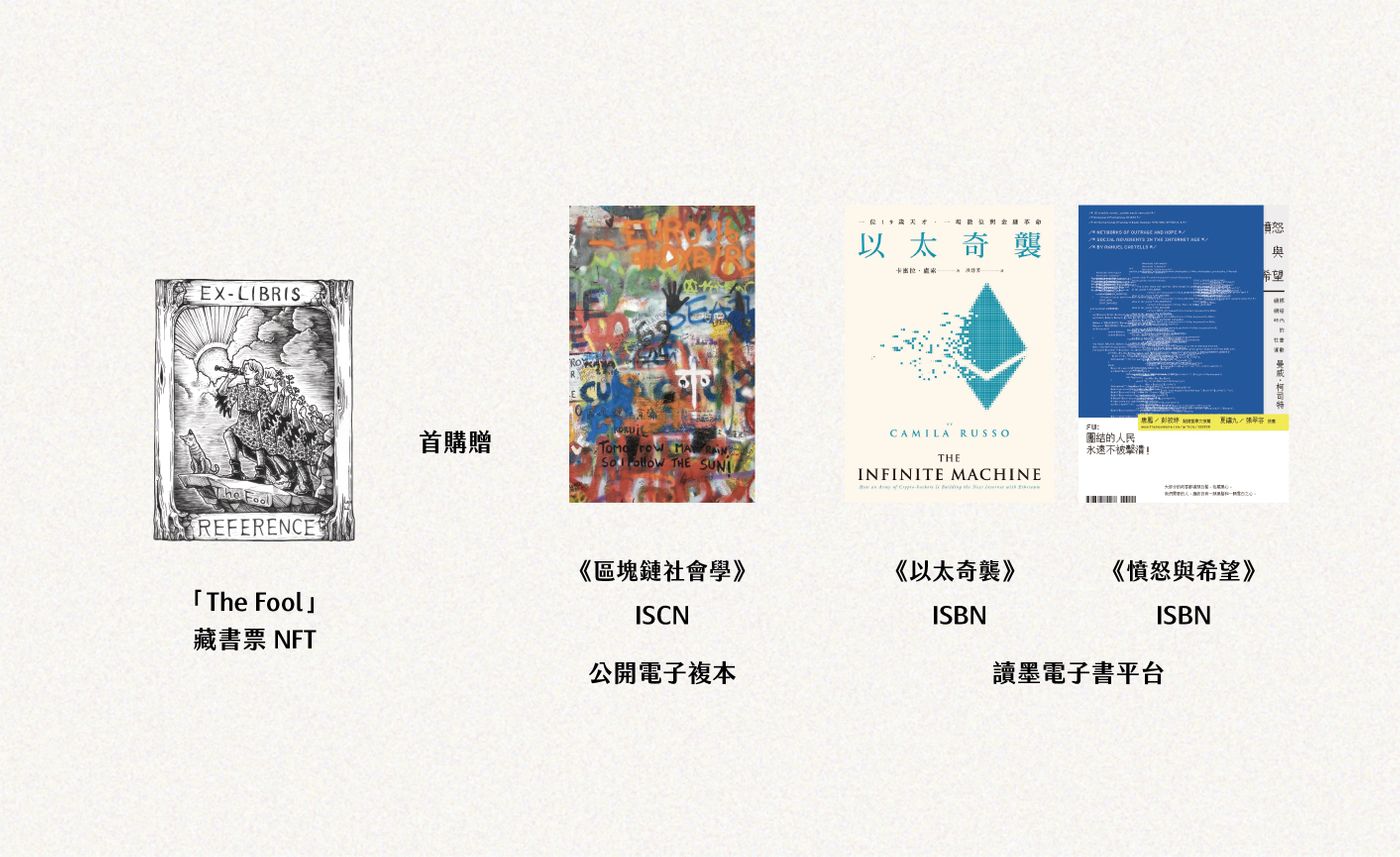
When cryptocurrency and NFT sales hit new highs, creators, collectors, investors, and arbitrageurs were all excited. When works or assets became more and more abundant, the mechanism and social context of blockchain were thrown into the mainstream news. behind the head.
In order to restore its social value and promote the basic knowledge of blockchain, Yinshudian tries to use NFT as an action medium.
Before the birth of the blockchain, the financial turmoil and the loss of trust in the government's intermediary (media covered by the government/banks that restrict withdrawals) "Rage and Hope"; then came the beginning of the trust mechanism in the Bitcoin period, and the social application of cryptocurrencies (BTC/LIKECOIN) "Blockchain Sociology"; finally came to the era of Ethereum, let the witch attack and the benevolent dictatorship together weave a brief history of the world computer (NFT/DAO) "Ethereum Raid".
Or you also see this book ticket action as a group buying action (the price is really lower).
The bookstore also recorded podcasts for these three books, and I participated in two episodes:
Bookstore Podcast
- EP. 59 "Anger and Hope" _ "You are the hope for the future of democracy"
- EP. 56 "Blockchain Sociology" FEAT. Soybean puree _ "Democracy and technology, Noah's Ark in the near future." 』
- EP.60 "Ether Surprise" feat. Soybean puree _ "ETH. DAO. V.”
In fact, we just reread the books we like and organize them, so that more friends who like this topic can discuss together.
For a detailed introduction to the book, see the introduction of the bookstore. I want to continue to discuss some interesting mechanisms in the blockchain world.
Automated profit sharing
NFT allows those who contribute to get due rewards
This NFT issuance uses the Taiwanese NFT platform AkaSwap on the Tezos blockchain. Its platform has the function of automatic profit sharing, which means that when you buy this book ticket, the cost will be distributed to all relevant parties in an instant. I will draw a diagram of the profit sharing mechanism to facilitate discussion.

20% of the funds are allocated to the design team, with Lala.W drawing the drawings, Haoenvski 3D modeling, and I am in charge of planning; 25% is directly allocated to Kin, who has his own wallet address, which is ckxpress.tez, and the remaining two books It was the bookstore that first bought it from Taiwan's e-book platform Readmoo, so the funds were allocated to the referencebookstore address ReferenceBookStore.tez.
(As an aside, my code name is mashbean.tez, which is the concept of a personal domain. As long as you pay about NT$120, you can apply for a Tezos domain name for one year. The domain name is bound to my wallet address, originally My wallet address is tz...ujr. After applying for a domain name, all my Tezos platform services and address garbled characters will be automatically replaced with mashbean.tez. For related discussions, please refer to my previous article "Social Capital (II) Chain "Reputation and Anti-Network Effects" . In addition, the domain name itself is also an NFT, you can click on Tezos Domain to read .)
The advantage of automatic profit sharing is that money can be distributed to all staff with zero seconds. This is a very romantic thing. Since then, there will be no owes, and all profits and losses will be shared by everyone.
donate
NFT makes income and donations invisible, and realizes public welfare and transparent cash flow
In addition, Kin's money, about 550 USD, will be assisted by me to set up the "See You Are Fellow Scholarship", which will be injected into the " Presence. Non-fiction General Scholarship> @"Present" Scholarship, for those who are separated from Hong Kong and those who propose to write Hong Kong writing.
"Presence" itself is also in the "no big stage" editing mode. By widely publishing hero posts, it recruits heroes from all walks of life to propose non-fiction articles. Compared with the traditional editing desk, it is also decentralized. I think this small donation is a kind of support for decentralization.
For a preliminary discussion on NFTs and public donations, you can read my article " What kind of NFTs can resist bubbles?" 》
writer profit
NFT profit sharing increases the proportion of writers' profit sharing
In addition, there are two differences in the selection of books this time, one is the books of the traditional publishing house, and the other is Kin's "Blockchain Sociology". Kin has been talking about decentralized publishing all the time, and I took this opportunity to make a comparison.
Traditionally, when a book is published, the profit for the writer is about 10%-25% of the selling price. In fact, it is lower than what the public thinks. In a bad economy, it is not easy to sell a book at a time. . In the past, because of professional division of labor, writers could concentrate on writing and increase productivity; but now because of channel competition and refinement, most of the profits are owned by channels.
Anything can be reversed, and the pendulum is gradually swinging back to the center. In this profit sharing demonstration, Kin, the author, can get 100% of the book selling price, and the e-book exchange volume follows the traditional publishing process, and the author, the publisher, and the e-book platform share the profit together. The difference between the two is not small.
in conclusion
ISCN has realized the possibility of anti-censorship publishing, and everyone can publish. However, the highly intensive publishing industry was once prosperous due to demand, but it is also facing a transition period. When will the two meet and how will they meet? Will it be disruptive, or incremental, and let's move on.
And this book ticket is just a small attempt on a long road.
Booklist NFT related information
- NFT link: akaSwap - THE FOOL
- If you want to discuss publishing, independent bookstore selection, or NFT, please join the Telegram discussion of the bookstore
https://t.me/+8qOa0P49h09kNDY1 - 2022/1/16 (Sun) is officially on sale, but before that, there is a so-called whitelist offer, please join Telegram too.
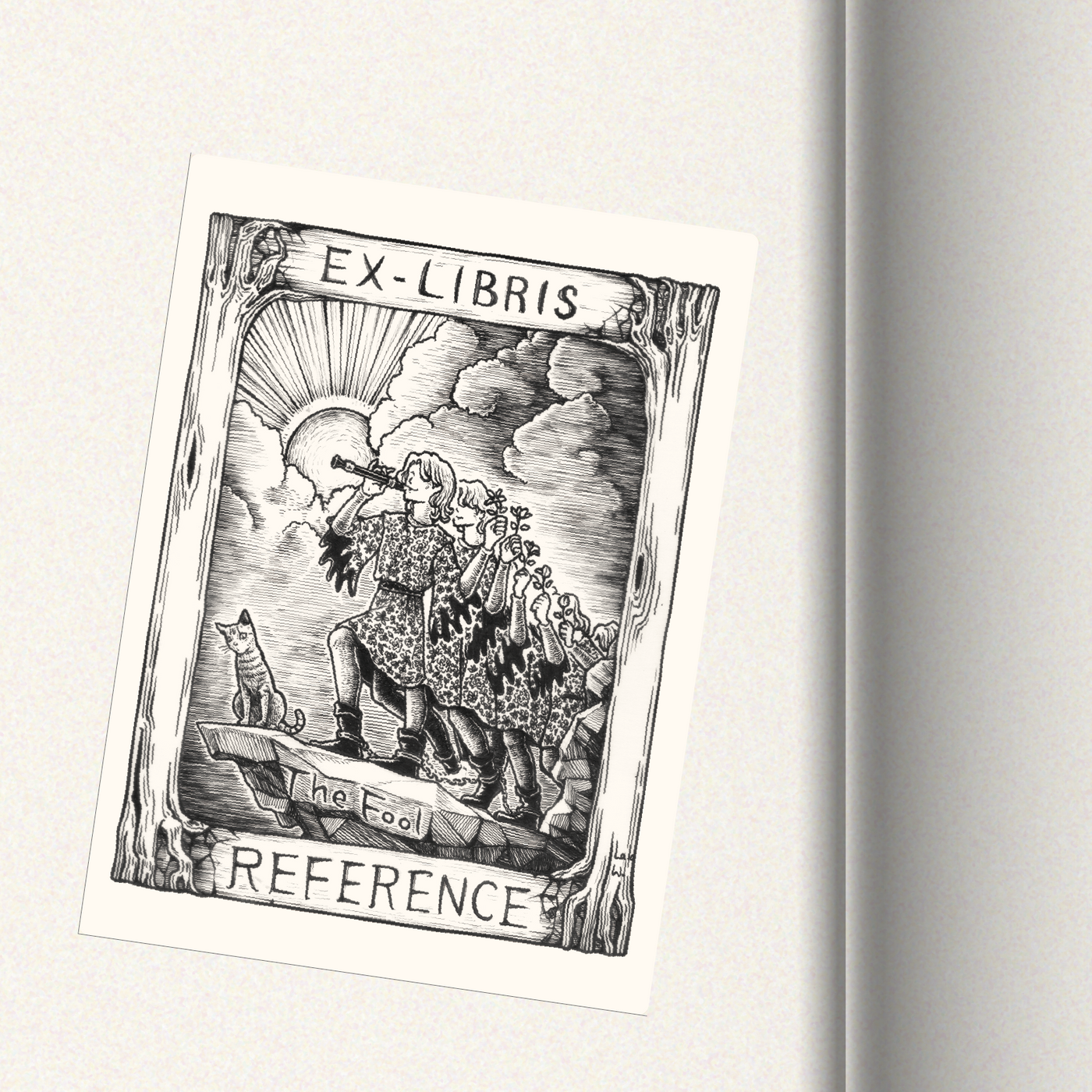
Like my work? Don't forget to support and clap, let me know that you are with me on the road of creation. Keep this enthusiasm together!












- Author
- More